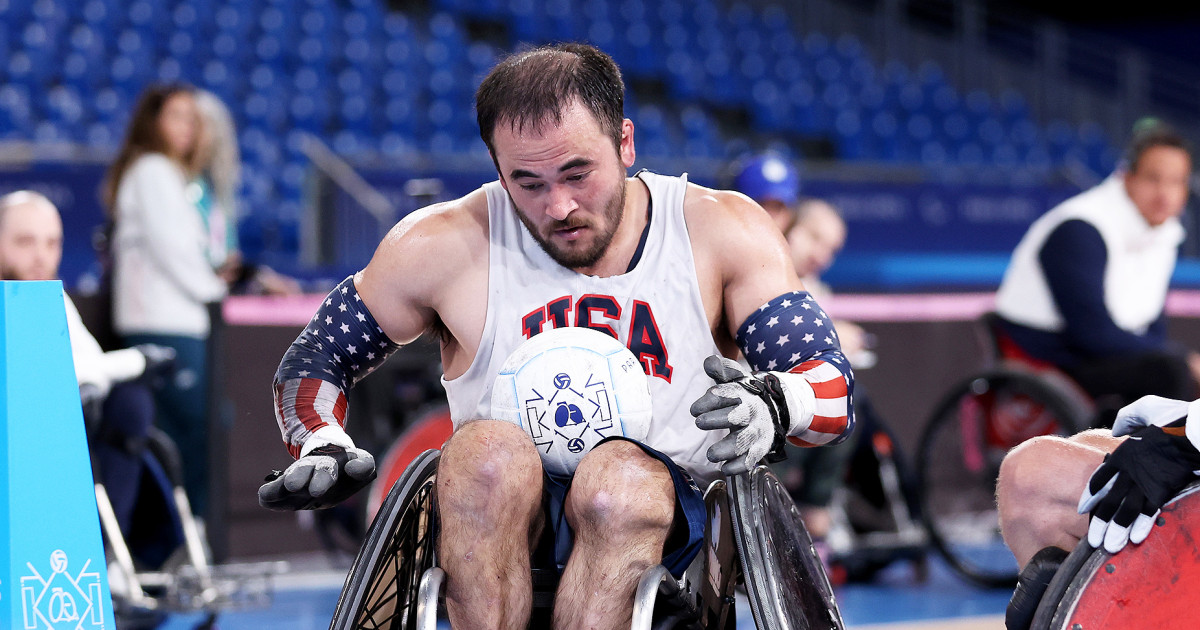Leading up to the Paris Paralympics, Chuck Aoki, a wheelchair rugby player, has been posting on social media to boost excitement about the Games. His videos touch on a wide range of topics, from jokes poking fun at team uniforms to helping viewers understand how the Paralympics are organized. The four-time Paralympian’s undergraduate degree is in teaching, and that passion drives some of his content.
“There is a dearth of resources about the Paralympics out there. There’s certainly some, and there’s certainly been some great work out there,” the 33-year-old from Ann Arbor, Michigan, tells TODAY.com. “Who better than the people who are doing it themselves to talk about it and take my owned lived experience, my own lived energy and say, ‘Hey, here’s what we’re doing. Come check us out’?”
But he stresses that it’s not disabled people’s job to teach others about disability.
“People with disabilities are often seen as responsible for educating people. And while I am so in for it, in no way is that actually our responsibility,” he says. “No one should have to educate people about disability, what it’s like. However, there are some of us who will educate and I’m more than happy to be the one to say, ‘Hey, if you want to learn about it, come talk to Chuck.’”
Falling in love with ‘Murderball’
Aoki has hereditary sensory and autonomic neuropathy type II, a genetic condition that causes reduced feeling in the limbs, according to the National Library of Medicine. He has little feeling below his knees and elbows.
Aoki played wheelchair basketball growing up. In 2005, the-then teenager saw the documentary “Murderball” about the wheelchair rugby team preparing for the 2004 Athens Paralympics. Soon, he was enamored with the sport.
“I watched people crashing into each other and smashing, going flying and trash talking, and shockingly the teenage boy was like, ‘Oh that looks fun, I want to do that,’” Aoki says.
When he attended his first practice, it seemed like there was some doubt about him, at least at first.
“They all looked at me because I was 5-foot-2 and weighed maybe 120, this little twig of a kid, and there are guys who were former football players and things like that, and they were like, ‘You want to play,’” he recalls. “I got beat up for two and a half hours straight and fell in love with the sport. Literally, I never played anything like it. It was exciting. It was fast. It was physical, and I also turned out to be pretty good at it.”
In 2012, he made the Paralympic team for the first time, and he’s been on an “incredible run ever since.”
“I played it for not too long when honestly I started to realize I was pretty good,” Aoki says. “The Paralympics became this possibility — this dream I had.”
Wheelchair rugby has a solid fanbase around the world, and it helps that it’s an exciting and unique watch.
“It’s really not like any other sport out there,” he says. “It’s a mix of rugby and hockey and soccer and basketball.”
The 1 thing to know before watching the Paralympics
For Olympics fans who enjoy learning about new sports and athletes, the Paralympics offer the same opportunity, Aoki explains.
“I love the process of someone finding out about something new, opening their eyes and discovering how much more there is,” he says. “I’ve honestly gotten to see that with my more educational content on the Paralympics. (I’ve) seen people say, ‘Oh this is cool. I never heard of this.’”
But before sitting down to watch all the action, Aoki says it’s important to understand the classification system — which matches athletes of similar abilities — for Paralympic events.
“The goal is … to have people of like ability competing against each other,” he says. “Visually impaired runners will compete against other visually impaired runners. You won’t have a visually impaired person going against a wheelchair user, for example, because that would be chaos.”
Aoki notes that within each classification, “there are a lot of nuances.”
Some visually impaired runners can see enough to run on their own while others might need to run with a guide, for example. For team sports, such as wheelchair rugby, classification works a little differently. Each player has a classification number.
In wheelchair rugby, the numbers go from 0.5 to 3.5, with the highest number having the most function. In a four-on-four match, the total player points cannot be more than 8.
“The fundamental idea of adaptive sports inclusion (is) to make sure there’s a space for people of all different ability levels to be able to compete,” says Aoki, whose classification number is a 3.
He’s particularly excited for this year’s Games because more sports than ever will be aired on Peacock.
“There’s going to be more live coverage than there’s ever been before. There’s going to be the Gold Zone coming back,” he says. “It’s absolutely going to be spectacular coverage, and I do think it’s going to provide so many people so much more access to be able to watch because the reality is it’s hard to get excited about something if you have no way to see or hear about it.”
“We saw so much excitement around the Olympic Games,” he continues. “I saw some people going, ‘Oh what am I going to do next?’ The Paralympics are coming up. … You can watch the same sports with so many incredible athletes.”
Tune into the Paris 2024 Paralympic Games on Peacock, starting Wednesday, Aug. 28.
Read the full article here
